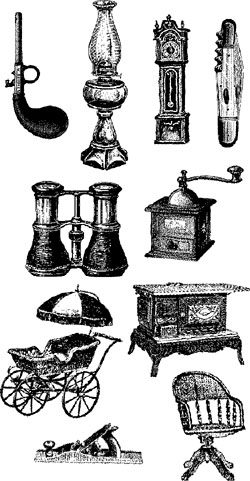I imagine that many of you have been to an auction of one kind or another. But antiques auctions are much more fun. They teach you about economics and the past. Many of the items will be of historic interest with fascinating stories to tell. That's what makes an antiques auction a delightful learning experience.
An auction is defined as "a public sale in which the price is increased by bids until the highest bidder becomes the purchaser." There are three parties involved in any auction: the owner of the item being offered, the auctioneer, and the bidder.
 Items that you buy in stores have price tags on them set by the producers. Sometimes the prices are discounted in sales, because the producer senses that not enough people are buying the objects at the price asked for. But at an auction, and particularly an antiques auction, the price is established by the bidder who wants it most.
Items that you buy in stores have price tags on them set by the producers. Sometimes the prices are discounted in sales, because the producer senses that not enough people are buying the objects at the price asked for. But at an auction, and particularly an antiques auction, the price is established by the bidder who wants it most.
This is known as "supply and demand." If the item being auctioned is one of a kind - say a valuable painting - the highest bidder sets its price, an indication of its value. In other words, value is determined by what someone is willing to pay for it.
If you want to be a collector of antiques, you should specialize in an area that interests you. For example, fountain pens, watches, baseball cards, stamps, postcards, games, toys, antiquarian books, old magazines, early telephones, paintings, theater memorabilia, etc. Many of these items are also offered on eBay auctions. But there is nothing like a live auction with people bidding against others.
If you are interested in an upcoming auction advertised locally, get a copy of its catalog and look it over to see if there is something you might want to bid on. Next to the listed item, put down the amount of money you are willing to spend. Many auctioneers now put their catalogs on the Internet where you can then download them.
When you get to the auction, you will have to register with the auctioneer who will then give you a card with a number on it. That is the card you will hold up if you want to bid on an item. Several hours before the auction you will have the opportunity to examine the items on exhibit in the auction hall. The items are all numbered as in the catalog, and if an item interests you, put a check mark next to the number in the catalog. If you don't have a catalog, write the number down on back of your card. So when the item comes up for bidding, you will be ready.
All goods at auctions are offered "as is," therefore it is important to look over the desired item carefully. I once bought an antique chair at an auction thinking it was in perfect condition, but when I got home I saw that it had a cracked leg. I hadn't had a chance to examine it before the auction, but it looked terrific when the auctioneer held it up. And so I bid on it. Had I known about the crack, I would not have made the bid.
However, there is no feeling quite as exhilarating as when you have won a bid on a great item and can take it home as your own possession.
If you have purchased a number of items and are not interested in what is being further offered, you can leave the auction before it is over. The people at the registration desk will have a record of what you have purchased, at the price you purchased it, and you can usually pay by check or cash. Some auctioneers take credit cards, but many don't. The auctioneer will also charge what is called a Buyer's Premium, usually 10 or 15 percent of the winning purchase price, which is a commission for selling the item.
Auctions can be both exciting and dangerous, in that you may have set your heart on getting an item and find yourself bidding far more than you can afford simply because you don't want the other fellow to get it. So, be prudent and enjoy the auction as educational and entertaining. If you can't afford an item, let it pass. There'll be another auction next week.